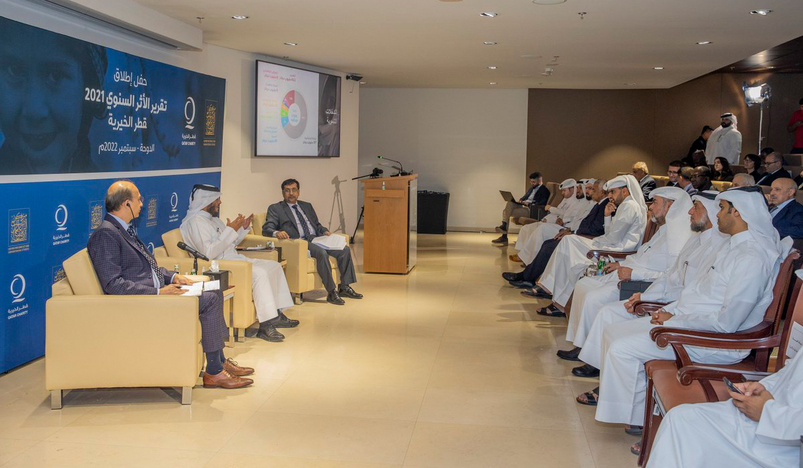
Qatar Charity
Qatar Charity, in cooperation with the Center for Conflict and Humanitarian Studies, launched at the Doha Institute for Graduate Studies on Monday the annual Impact Report for the year 2021, in the presence of HE Minister of Social Development and Family Maryam bint Ali bin Nasser Al-Misnad, HE Special Adviser to the Secretary-General of the United Nations on Public-Private Partnerships and Islamic Social Finance Dr. Ahmed bin Mohammed Al Muraikhi, and CEO of Qatar Charity Yousef bin Ahmed Al Kuwari.
The launch of the report was followed by a panel discussion on the Humanitarian-Development-Peace Nexus (HDPN), moderated by Director of the Center for Conflict and Humanitarian Studies Dr. Ghassan Al Kahlout, and was attended by Qatar Charity Assistant CEO for Governance and Development Sector Mohammed Ali Al Ghamdi, and UNDP Technical Representative and Head of Office in Doha Biplove Choudhary.
In his welcome speech, CEO of Qatar Charity Yousef bin Ahmed Al Kuwari highlighted the most important achievements of Qatar Charity in 2021, calling it the year of recovery and hope.
Al Kuwari shed light on the support of major donors and the Qatari community in the implementation of projects that have positively affected 10 million beneficiaries in 49 countries, noting that 95% of the donations were provided by individuals.
He noted that Qatar's charitable contribution during the past year amounted to about $363 million, aimed to provide short-term humanitarian assistance, in addition to strengthening the link between humanitarian work and development.
Al Kuwari also stressed the achievement of key contributions based on the implementation of long-term solutions in conflict-affected environments such as Afghanistan, Syria and Yemen, as well as maintaining a firm commitment to the Syrians, Palestinians, Yemenis, Rohingya and Somali communities.
For her part, HE Minister of Social Development and Family Maryam bint Ali bin Nasser Al-Misnad praised the achievements made by Qatar Charity in terms of humanitarian support locally and internationally, and the humanitarian development efforts it has been making while adhering to supporting the Qatari citizens and the keenness to achieve stability and prosperity, and harness all State's capabilities to provide a safe environment that achieves social and economic development.
HE the Minister said that humanitarian work requires maintaining human dignity, stressing the need to continue listening to the requirements and aspirations of the local and global community, as human being has been always the main goal.
Her Excellency added that with the congestion of conflicts, crises, disasters, displacement and the effects of climate change surrounding the humanitarian community, Qatar Charity is still racing against time to stop the suffering that hits the humanitarian community, as it had an active role in responding to these growing needs during the year 2021.
She expressed her deep thanks and appreciation to the soldiers of humanitarian and charitable work in the State of Qatar, who continue to work to serve the Qatari citizen, and to achieve his prosperity and growth, in line with the Qatar National Vision and Strategy 2030, praising the efforts of charitable organizations in Qatar because of its efforts that do not stop supporting every suffering person on this earth.
In a related context, HE Dr. Ahmed Al Muraikhi focused in his speech on the Human Development Report of the United Nations program 2021/2022 entitled "Time of Uncertainty, Life without Stability: Shaping Our Future in a World that is Transforming", which refers to the decline of human development and increasing awareness in the humanitarian field.
He highlighted that uncertainties have created a storm in economic and human insecurity, but they are still seen as an opportunity for transformation, by referring to untapped dynamic solutions to empower individuals.
According to the UN report, Dr. Al Muraikhi pointed to the possibility of transformation through investments in global public goods, the expansion of insurance, and the application of innovative approaches through the promotion of dynamic solutions.
He particularly focused on the initiatives implemented by Qatar Charity, including different initiatives, stressing that such an approach is considered the key to saving the sustainable development goals and transforming our unstable lives.
The panel discussion provided full support for the implemented humanitarian projects, revealed the main trends of humanitarian assistance with differences between traditional and non-traditional donors, touched upon the relevant challenges in the current context, and discussed the association as a new concept for the Arabic language as well as the humanitarian field.
Dr. Ghassan Al Kahlout stressed the importance of adopting the link between humanitarian action, development and peace as an approach and a reform initiative, noting that the Gulf countries have approached the advantage of non-traditional donors with a less clear demarcation between the humanitarian, development and peacebuilding sectors, and have already adopted some elements of interconnected work before the announcement of the humanitarian summit to introduce this approach.
The questions and Answers section concluded with remarks on the importance of cooperation with the United Nations in designing responses to potential challenges, with the priority of community participation and decisions on the "Association" approach, while the discussion focused on the importance of adopting the association between humanitarian action, development and peace during the performance of humanitarian work, and on behalf of local donors in the affected countries, in order to provide effective solutions in the long term.
(QNA)
.jpg)
Qatar Secures Place Among the World's Top 10 Wealthiest Nations
.jpg)
Hamad International Airport Witnesses Record Increase in Passenger Traffic

Saudi Arabia: Any visa holder can now perform Umrah

What are Qatar's Labour Laws on Annual Leave?
Leave a comment